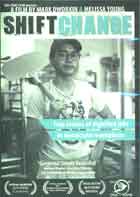
Shift Change 2013
Distributed by Bullfrog Films, PO Box 149, Oley, PA 19547; 800-543-FROG (3764)
Produced by Moving Images
Directed by Melissa Young and Mark Dworkin
DVD, color, 70 min.
Sr. High - General Adult
Business,Economics
Date Entered: 10/16/2013
Reviewed by Michael J. Coffta, Business Librarian, Bloomsburg University of PennsylvaniaTransient businesses leave wounded local economies behind in favor short term financial incentives in other communities. This brilliant work examines the success stories of employee-owned and run cooperatives, and goes further to advocate the formation and promotion of such stable and sustainable work environments.
Beginning after the Spanish Civil War, Spain’s Mondragon cooperative initiatives have shown the world a model for building stable middle classes. Cities such as Cleveland, Ohio and Madison, Wisconsin have similar well established cooperatives, encompassing a variety of industries. The film pays close attention to the breadth of these industries and enterprises. They center on training and education, but also include many “economic downturn resistant” industries such as alternative power and specialized machinery manufacturing. The film also emphasizes the diverse makeup of these cooperatives, including various ethnic groups. The goal is not to simply survive as a source of labor. These cooperatives succeed in becoming profitable, competitive forces.
The primary drive of this work is the exposition of the inner workings of these cooperatives. The workers are not only vested as owners, but equally share in the decision making processes. The lack of traditional hierarchies and conventional management is evident in these organizations. Workers are constantly motivated and often rotate jobs so as to keep the work experience fresh. A deliberate intention in these cooperatives is to encourage the democratic spirit of the workplace to be fostered in the cooperatives’ communities. The documentary concludes with a selection of accounts of new branches of cooperatives, such as those for coffee growers in developing economies.
This work is positively fascinating and inspiring. While viewing this, one may often find oneself asking, “How can I get started?” The film not only lays out a blueprint for success in forming a progressive cooperative, but encourages the practice as a manner to establish a community consciousness. The film is not so rosy as to assume that such a project will naturally fit into any community or market. The film addresses such issues as wage pressures, competition, and globalization.
This is a beautifully crafted film. The filmmakers regularly provide visual contrasts, such as the one between the display of dilapidated factories and run-down neighborhoods of old, and the well maintained homes in similar cooperative-centric neighborhoods. The music is subtle and contributes to the tone and experience of each portion of the work.
The only conspicuous criticism is, strangely, found in its length. As uplifting and encouraging as the film is, it loses impetus as numerous cooperative employees express nearly identical uplifting messages time after time. This is not to diminish the sincerity and dedication with these cooperative workers and their core message. Nevertheless, the film comes through in cogent fashion with not only personal narratives, but data on production and market penetration. In its bonus features, the filmmakers offer nine short film case studies ideally suited for stimulating discussion in an educational setting, and provoking reform in a business setting.